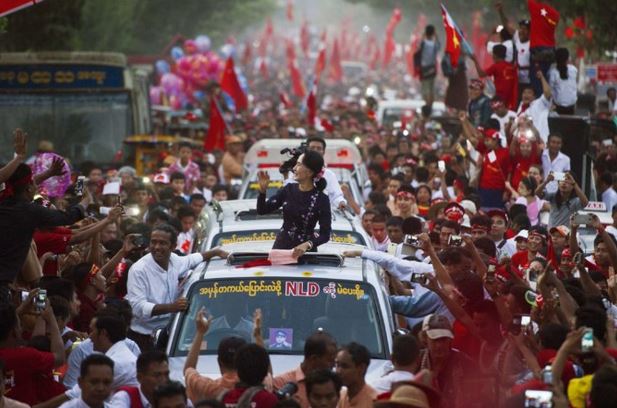Myanmar Election Spells a Victory for Democracy Still to be Won
Photo Credit: Ye Aung Thu/Agence France-Presse — Getty Images Suu Kyi campaigns in a city in Maynmar.
November 17, 2015
As of Wednesday, Myanmar’s National League for Democracy (NLD) has won a historic majority in the nation’s parliament. This comes after nearly 50 years of military rule for the country, during which an often oppressive regime ruled strictly over its citizens. The NLD, led by Nobel laureate Aung San Suu Kyi, has been at the forefront of the country’s democracy movement for the past few years, and many hope that this election signals an important step towards Myanmar’s transition into a free and fair state.
“The results of the elections are extremely promising,” says Jake La Fronz, a CGI junior at FTHS. “But the future of Myanmar still remains very unclear, due to the religious divisions, and the remnants of authoritarian military rule.”
The result of the elections means that the NLD will choose the nation’s next President, however, it cannot be their leader, Suu Kyi. Although she is both a beloved icon and the face of democracy in Myanmar, a change in the constitution prevents anyone with foreign family members from taking the position. The constitution was originally created by military generals who took over the nation in 1962, and was designed to allow them to retain power, even after a future electoral defeat. Still, Suu Kyi, whose late husband was British, asserts that she will be “above the President,” and continue to take part in leading Myanmar in a democratic direction.
In winning a majority in both houses of Parliament, the NLD now has control over both the legislative and executive branches of government. This displays a largely unprecedented display of political strength for both Suu Kyi, and Myanmar’s democracy movement. Still, the key to future progress will be ongoing cooperation between the new regime and the old.
Although the current military government has conceded the election to the NLD, they will continue to have a heavy hand in Myanmar’s politics. Despite the NLD’s apparent control, the police, army, and much of the bureaucracy remain under either military influence or complete control. Constitutionally, the military establishment is entitled to 25% of the seats in Parliament, making it difficult for another party to gain a parliamentary majority. And, even though the NLD has succeeded in this feat, the military retains the right to veto all amendments proposed to the constitution. Change may come to Myanmar, but it will certainly not come easily.


















































